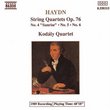| All Artists: Dino Mantovani, Umberto Giordano, Gabriele Santini, Rome Opera Orchestra & Chorus, Franco Corelli, Anna di Stasio, Antonietta Stella, Luciana Moneta, Mario Sereni, Paolo Montarsolo, Paolo Pedani, Piero de Palma, Piero dePalma, Stefania Malagu Title: Giordano: Andrea Chenier Members Wishing: 0 Total Copies: 0 Label: Angel Records Release Date: 9/20/1994 Genre: Classical Styles: Opera & Classical Vocal, Historical Periods, Modern, 20th, & 21st Century Number of Discs: 2 SwapaCD Credits: 2 UPC: 724356528727 |
Search - Dino Mantovani, Umberto Giordano, Gabriele Santini :: Giordano: Andrea Chenier
 | Dino Mantovani, Umberto Giordano, Gabriele Santini Giordano: Andrea Chenier Genre: Classical
|
Larger Image |
CD DetailsSimilarly Requested CDs
|
CD ReviewsWhat Grand Opera is about. L. E. Cantrell | 01/09/1999 (5 out of 5 stars) "Some of the most awe-inspiring tenor singing I have ever heard. Big open-throated lush Italianate voices. Nothing begins to approach the limit of their abilities. Gorgeous melodies. Great baritone..no one today with his ability." Pria che l'ultima mia strofe sia finita ... Before my last L. E. Cantrell | Vancouver, British Columbia Canada | 07/19/2006 (5 out of 5 stars) "SOURCE: Studio recording taken at the Rome Opera House in June and July 1963. SOUND: Good 1960s analog stereo, with a successful digital remastering in 1994. It will sound fine to all but the fussiest audiophiles. CAST: ANDREA CHENIER - Franco Corelli (tenor) MADDELENA DI COIGNY - Antonietta Stella (soprano) CARLO GERARD - Mario Sereni (baritone) BERSI - Stefania Malagu (soprano) LA CONTESSA DI COIGNY - Luciana Moneta (mezzo-soprano) MADELON - Anna di Stasio (soprano) IL ROMANZIERO PIETRO FLEVILLE - Dino Mantovani FOUQUIER-TINVILLE, ACCUSATORE PUBBLICO/ROUCHER - Giuseppe Modest IL SANCULOTTO MATHIEU called "POPULUS" - Paolo Montarsolo L'ABATE, POETA/UN "INCREDIBILE" - Piero de Palma SCHMIDT/IL MAESTRO DI CASA/DUMAS - Paolo Pedani. CONDUCTOR: Gabriele Santini with the Orchestra e Coro del Teatro dell'Opera di Roma. DOCUMENTATION: Libretto in Italian and English. Nicely informative essay on Giordano and the creation of "Andrea Chenier" written by William Weaver in 1964. Track list that identifies main singers, provides timings and give the appropriate page references in the libretto. Summary of the plot (in English, German and French) tied into track numbers. Nothing on the performers and not much more on the circumstances of the recording. FORMAT: Disk 1 - Act I, tracks 1-15; Act II, tracks 16-25; 58:53. Disk 2 - Act III, tracks 1-14; Act IV, tracks 15-19; 56:30. COMMENTARY: "Andrea Chenier" premiered on March 28, 1896. Its librettist was Luigi Illica, who must have added greatly to the struggling young composer's frustrations because he, in the ever feckless way of librettists, was also simultaneously writing the text first for Puccini's "La Boheme" and later for "Tosca." "Andrea Chenier" is a verismo opera--which pretty much means that a certain class of critics write if off as coarse, unsubtle, loud and vulgar. Ignore them and their prissy quibbles. "Chenier" is a terrific coarse, unsubtle, loud and vulgar opera! The plot picks up just before the full torrent of the French Revolution. Gerard, a servant, expresses the pent up rage of the lower classes as he prepares the di Coigny residence for a party. Silk-clad and perfumed aristos enter and toss off a few words about worrisome current events, but they are more concerned with the elegant pleasures of the evening. An intense young man, Andrea Chenier, is introduced as a poet. Not very gently, the daughter of the house, Maddelena di Coigny, demands that the new poet recite. He does so in an aria paraphrased from Chenier's actual words, "Un di all'azurro spazio," that denounces the hypocrisy of Maddelena and the other party-goers. In the second act, the Reign of Terror is fully unleashed. The House of di Coigny has fallen. Maddelena is a fugitive. Gerard is a popular hero to the mobs of Paris. Chenier is a public figure, but one not greatly beloved by Robespierre and his circle. The wise thing for him would be to flee the dangerous city but he remains because of letters he has received from a mysterious woman. It is Maddelena, of course. They meet. A spy for the Terror recognizes her. Gerard appears. Chenier attempts to get Maddelena away to safety. He and Gerard get into a scuffle in which Gerard is wounded. Chenier flees. Help arrives for Gerard. "Who did this?" he is asked. Gerard, who has loved Maddelena from afar and who admires Chenier, hesitates and then says he doesn't know. In Act III Chenier is imprisoned. Gerard, torn between his revolutionary zeal and his admiration for the poet, reluctantly writes out a denunciation of Chenier as an enemy of the state, "Nemico della patria?!" Among the charges are that he was born in Constantinople--a foreigner!--a soldier!--a poet!--and so it therefore follows--a traitor! Gerard knows the falseness of it all and despises himself. Maddelena appears. She tells Gerard of the horrors she and her family have experienced ("La mamma morta"). She offers herself to Gerard if he can save Chenier. It is too late. Chenier has been brought before the revolutionary tribunal. He defies them. Gerard withdraws his denunciation, but to no avail. Chenier is condemned. At the beginning of Act IV, Chenier awaits his execution. In an aria paraphrased once again from the actual Chenier, "Come un bel di di maggio," he bids farewell to his life. Maddelena joins him, brought to the jail by Gerard. She has chosen to take the place of a condemned woman so that she may join Chenier in death. In a great swell of music they declare their deaths to be the triumph of love and they depart together for the guillotine. The three principal singers of this recording are Corelli, Stella and Sereni. More than twenty years ago, that good grey British magazine, The Gramophone, reviewed this set and disdainfully offered these words on Franco Corelli's voice, "as pure sound it is quite stunning. About as stunning and as subtle as a pneumatic drill, in fact: once one has got over the sheer splendour and effortlessness of his vocalism one soon wearies of the unremitting volume and the cavalier attitude to notes and words". Of Antonietta Stella The Gramophone's reviewer granted that "she has a sense of line and phrase" but that she "is not always precise in her intonation and too often allows a throaty parlando manner to stand in for genuine expressiveness: a serviceable reading, no more." Mario Sereni, on the other hand, "gives a performance of real distinction," using it "subtly and intelligently to convey the disillusioned idealism at the centre of Gerard's character." That was then, a time when powerful Verdian and verismo voices were still fresh in recent memory. Today, there is nobody to match Corelli's stunning voice and precious few who can on their very best days match Stella--even though the 1963 recording catches both of them just a little past their vocal prime. Sereni is good, no question of that, but to me he sounds a bit too old for Gerard, and lacking in the angry bite that this most conflicted of characters should have. This is a very good recording with great performers captured in decent sound. The attractive price is another advantage. Five stars. FOR THE HISTORICALLY CURIOUS: Andre Marie de Chenier (1762 - July 25, 1794) was born in Istanbul where his father served in effect as French consul. The Cheniers were a prosperous merchant family who, but for the French Revolution, would soon have bought or married their way into the nobility. (Think of Sophie's father in "Der Rosenkavalier.") Andre attended the French military academy, St Cyr, but he quickly dropped out to become a poet and a fixture at Parisian salons. Although he was moderately productive as a poet, only two of his poems were published during his lifetime. When the Revolution came, soon to be followed by the Terror, he was far better known as a composer of polemics and satires--some directed uncomfortably close to Robespierre. On the 7th of March 1794, Andre Marie de Chenier was arrested by agents of the Committee of Public Safety who were searching for a fugitive marquise. Chenier, in the wrong place at the wrong time, was arrested on suspicion. He was imprisoned for 140 days. He wrote some of his best verses while awaiting his fate. On the 140th day he was brought before the tribunal. There, he was condemned. They killed him at sunset. LEC/Am/06" Wonderful L. E. Cantrell | 03/04/2000 (5 out of 5 stars) "This is the best Andrea Chenier I have ever heard. No one comes close to the exceptional voice of Corelli. The entire production is wonderful! I recommend it very highly."
|

 Track Listings (25) - Disc #1
Track Listings (25) - Disc #1








